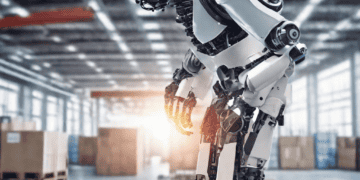In recent years, the world has faced various unexpected challenges, ranging from the global pandemic to geopolitical conflicts like the Russia-Ukraine situation. These events have had far-reaching implications, and the term “supply chain issues” has become increasingly common, with factors such as travel restrictions and border complications making logistics more complex.
However, there is a potential solution on the horizon: artificial intelligence (AI). This article explores how AI can play a vital role in supply chain management and examines its potential impact on the future of this industry.
Supply Chains and AI
Artificial intelligence has often been associated with robots and assumed to have limited applications, primarily focused on automating repetitive tasks or performing basic functions. Historically, AI has been used for tasks like determining optimal material purchase timing and quantities based on human-defined strategies.
However, AI has evolved significantly beyond this point.
One of its most promising branches is machine learning, enabling software to not only execute pre-programmed commands but also learn from data over time and make decisions autonomously. This advancement allows AI to undertake more complex tasks, with applications ranging from creating “deepfakes” to winning chess matches.
Within the realm of supply chains, machine learning can be employed not just for calculations but also for making informed purchasing decisions based on past successes and failures. It can automate processes along the Plan-Source-Make-Deliver (SCOR) continuum, such as adjusting inventory levels in response to supply fluctuations or assisting companies in navigating customs and trade regulations, a significant source of delays.
AI may even integrate with blockchain technology to execute smart contracts, offering enhanced supply chain transparency and ensuring timely payments.
Companies poised to benefit from this shift include C3.ai (AI), which has developed inventory optimization software utilizing AI and ML algorithms, and the cloud platform Coupa (LON: 0I4B), which has introduced features to assist firms in making AI-driven supply chain decisions.
The Role of AI During Crises
While machine learning excels at decision-making based on available data, there are moments when extraordinary events occur, and no relevant historical data is available. Examples include events like the COVID-19 pandemic, which fall under the “black swan” category. Can AI still contribute to guiding supply chains during such unforeseen circumstances?
AI is not a miracle solution and cannot, for instance, teleport transportation vehicles. However, it can play a crucial role in identifying areas of high systemic risk within a supply chain. Machine learning can virtually recreate a supply chain to pinpoint vulnerabilities, ultimately strengthening the chain to withstand unexpected shocks. Additionally, AI can create simulations to visualize the potential outcomes of different responses to various scenarios.
The Russia-Ukraine conflict is another event that has disrupted supply chains due to the reliance on these regions for essential commodities like wheat and gas. During shortages, it becomes imperative to monitor inventory levels effectively and make the most of available resources—this is an area where AI can make a significant impact. By combining Internet of Things (IoT) technology and machine learning, inventory can be automatically tracked across the supply chain and accessed via a database, complete with analytics.
Cost Considerations
Implementing AI in supply chain management can be an excellent solution, but it must be financially feasible for companies. Supply chain activities already account for up to 50% of business costs, leaving little room for additional expenses. The adoption of AI will partially depend on how many businesses are willing to invest in this technology, with early adopters likely bearing the brunt of the costs.
However, in the long run, the enhanced efficiency resulting from a technologically advanced approach should help offset expenses. According to a McKinsey report, early adopters of AI-enabled supply chain management tools reduced their logistics costs by 15%. As the saying goes, “no pain, no gain.”
The Future of Supply Chains and AI
Some experts believe that the ongoing innovation in the supply chain industry is comparable to the transformation that occurred in the banking sector in the 1970s when ATMs replaced human bank staff. It is projected that the supply chain market will experience a growth of 42.9% from 2017 to 2023, reaching a value of $6.5 billion, partly thanks to innovations like AI integration.
Nonetheless, unanswered questions remain, such as the potential vulnerabilities to cyberattacks disrupting the entire supply chain and whether AI alone can navigate unprecedented events like pandemics and geopolitical tensions.
Concerns about job displacement due to AI replacing certain tasks are also prevalent. However, the reality is likely to involve professionals adapting to new roles, collaborating with AI, rather than being replaced. Innovation in this field appears inevitable, with the key challenge being to find the most effective ways to adapt and address potential issues along the way.
Catch the latest supply chain news at The Supply Chain Report. Learn more about international trade at ADAMftd.com with free tools.
#AIinSupplyChains #ArtificialIntelligence #SupplyChainManagement #MachineLearning #LogisticsInnovation #SupplyChainOptimization #BlockchainTechnology #SmartContracts #InventoryManagement #Coupa #C3ai #SupplyChainResilience #AIandSupplyChains #FutureOfSupplyChains #TechDrivenLogistics #CostSavingsThroughAI #McKinseyReport #AIForCrisisManagement #PandemicSupplyChainImpact #GeopoliticalSupplyChainChallenges #SupplyChainSimulation #SupplyChainAutomation #AIInBusiness #AIandBlockchainIntegration #AIInLogistics















